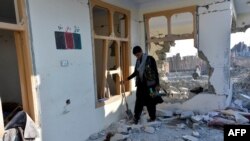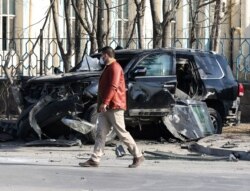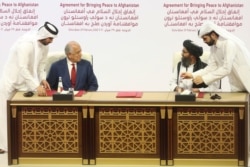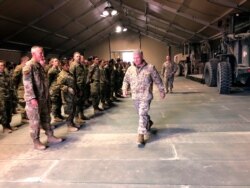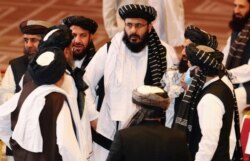Multiple attacks in Afghanistan Tuesday killed at least 10 police officers and government employees, a day after a top U.S. general warned violence in Afghanistan was “simply too high.”
Four of the people killed Tuesday were civilian employees of the Afghan government and were shot in Kabul by unknown gunmen. Another was a driver working for the Afghan Foreign Ministry who died when his car was targeted using a magnetic bomb.
Five more men, members of local police called the Afghan Public Protection Force, were killed in two separate explosions in Herat and Badghis provinces.
In an online discussion hosted Monday by the Washington-based Middle East Institute, General Kenneth McKenzie, the commander of the U.S. Central Command that covers the Middle East and parts of South and Central Asia, said he was “concerned about the actions the Taliban have taken until this point.”
McKenzie was referring to Taliban actions since the group struck a deal with the United States in February of last year.
While the Taliban have stopped direct attacks on foreign forces, their attacks on Afghan forces have increased. The Afghan government and Western officials also blame them for a surge in killings.
McKenzie said a “negotiated political settlement” was the best way forward for Afghanistan but both sides would have to compromise.
Targeted killings of activists, journalists, and government employees in Afghanistan have been on the rise in the last few months and drawn repeated international condemnation.
“Enemy attacks in Kabul were higher than during the previous quarter. They were much higher than in the same quarter last year,” according to the latest report by the U.S. special inspector general for Afghanistan reconstruction, released on January 30th.
A survey by local news channel Tolonews identified 60 “security related incidents” — attacks, explosions, targeted killings — in Kabul during November and December.
A joint statement issued at the end of January by the European Union, NATO, the United States, and multiple other Western nations condemned “the continuation of assassinations, kidnappings, and destruction of vital infrastructure” which was targeted at “civil society, judicial, media, religious, medical, and civilian government representatives.
Responding to the statement, the Taliban called the charges “baseless” and “unsubstantiated” and said it had no hand in civilian killings. Instead, the group blamed the violence in Afghanistan on “foreign occupation.”
Afghanistan’s First Vice President Amrullah Saleh tweeted last week that 85% of the Taliban members released as a result of a deal between the U.S. and Taliban last year had returned to “violence and campaign of massacre of civilians.”
On Tuesday he tweeted that Afghanistan’s intelligence had captured a teenage boy “used by Taliban for magnetic mine explosions in Kabul city.”
Magnetic mines, locally known as sticky bombs, are small improvised explosive devices that are easy to attach to a car and are widely used for targeted assassinations.
The Taliban and an Afghan delegation including government representatives began talks in September to end Afghanistan’s long-running internal war. But the negotiations have yielded little so far.
The newly elected administration of U.S. President Joseph Biden is reviewing America’s Afghanistan policy and expected to come out with its own version soon.
A 15-member congressionally mandated group called the Afghanistan Study Group recommended last week that, based on the conditions on the ground, the Biden administration should revise a May 2021 date to withdraw all U.S. troops from Afghanistan.
The date was a result of the U.S.-Taliban deal. The Taliban have warned that any deviation from that agreement would lead to a dangerous escalation in the war.




